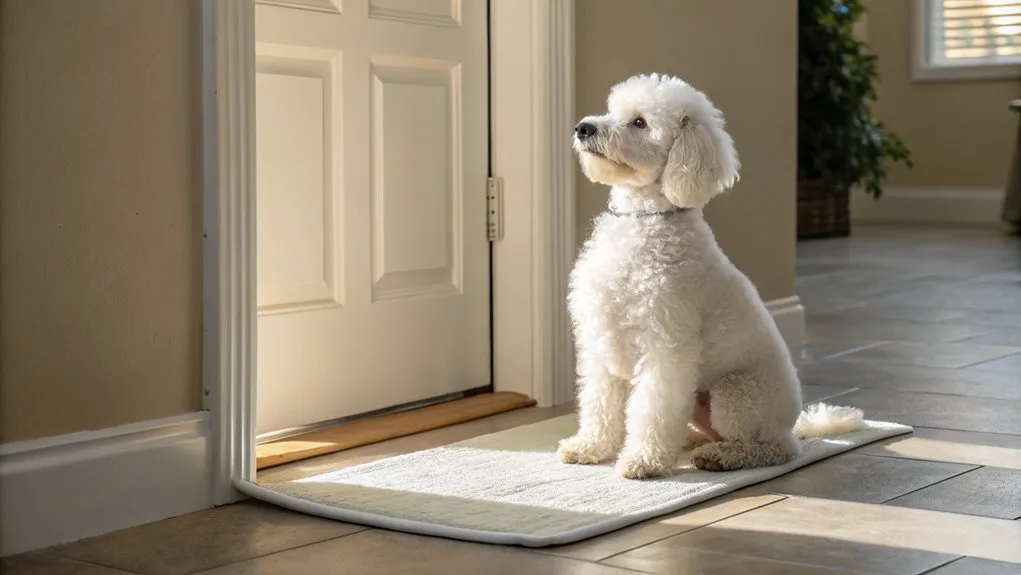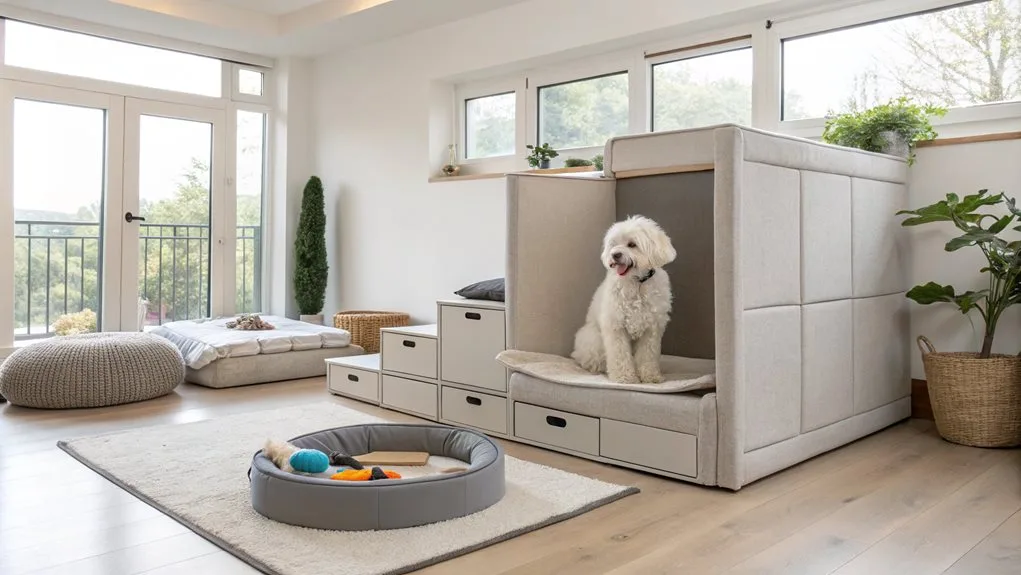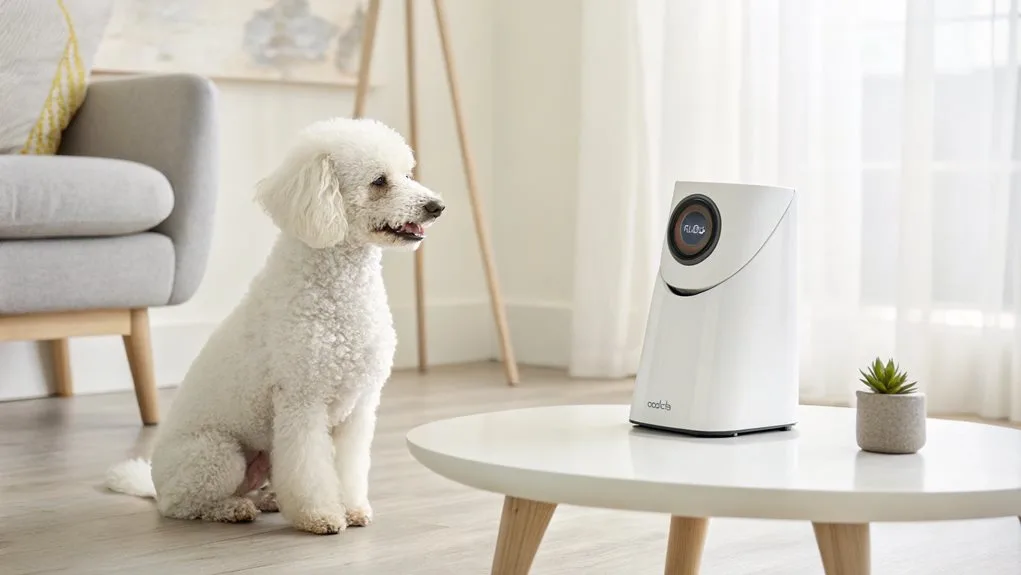Modern Solutions For Your Poodle’s Time-Alone Struggles

You’ve noticed your poodle’s distress when you leave home, and it’s time to transform those anxious moments into opportunities for growth.
Separation anxiety doesn’t have to define your dog’s daily experience, and modern solutions offer innovative ways to support their emotional well-being. From smart technology to targeted behavioral strategies, you can help your furry companion develop confidence and resilience.
What if you could turn those lonely hours into a journey of empowerment for your poodle? The next few insights might just change everything about how you approach your time apart.
Key Takeaways
- Implement systematic desensitization training with gradual separation periods, using positive reinforcement to build your poodle’s confidence and emotional resilience.
- Leverage smart technology like two-way video communication systems, GPS-enabled tracking, and AI-powered health monitoring to maintain real-time connection during alone time.
- Create a dedicated home sanctuary with interactive puzzle toys, calming background music, and comfortable resting spaces to reduce anxiety and mental stress.
- Establish a consistent daily routine incorporating substantial physical exercise, mental stimulation activities, and structured training sessions to prevent boredom and excess energy.
- Consult professional support, including certified dog trainers and veterinary behaviorists, who can develop personalized strategies and recommend targeted interventions for separation challenges.
Poodle Personality and Separation Challenges

Poodles are uniquely susceptible to separation challenges due to their complex psychological profile. Their extraordinary intelligence creates a heightened awareness of environmental changes, making them acutely sensitive to owner departures.
Genetic predisposition suggests that some poodles may have an inherited tendency toward anxiety disorders that further amplifies their separation response. Their high-energy nature and need for constant mental stimulation means cognitive understimulation can dramatically intensify separation anxiety symptoms.
Poodles are ranked among the top 5 most intelligent dog breeds, which contributes to their acute sensitivity to changes in their environment.
This cognitive sophistication means they quickly recognize departure cues, which can trigger anticipatory anxiety before you’ve even left the house. Neurological research indicates that these dogs possess specialized neural pathways that heighten their emotional processing and attachment responses.
Their profound emotional dependency compounds these challenges. Poodles form intense bonds with their owners, resulting in a vulnerability to distress when social connections are disrupted. Systematic desensitization techniques can provide a structured approach to helping poodles manage their separation anxiety more effectively.
Their affectionate nature, while endearing, predisposes them to experiencing significant emotional turbulence during periods of isolation. Breed-specific exercise requirements indicate that standard poodles need substantial daily physical activity, which can further amplify their emotional sensitivity when confined or isolated.
Genetically and environmentally, poodles are primed for separation sensitivity. Early life experiences, routine disruptions, and owner interaction patterns can substantially influence their anxiety response.
Without proper intervention, their natural inclination toward social engagement and mental stimulation can transform into persistent separation-related behavioral issues.
Understanding these intricate psychological dynamics is vital. By recognizing the interconnected factors of intelligence, emotional attachment, and social needs, you can develop targeted strategies to mitigate your poodle’s separation challenges and support their emotional well-being.
Building a Rock-Solid Daily Routine

Setting up a rock-solid daily routine can transform your Poodle’s emotional landscape and mitigate separation anxieties.
By systematically integrating physical exercise, mental stimulation, and consistent social interactions, you’ll create a structured environment that reduces stress and builds resilience. Standard Poodles, in particular, require extensive mental and physical engagement due to their high intelligence and energy levels.
Begin with a 60-minute daily exercise regimen that balances low-impact activities like walking with engaging mental challenges. Incorporating interactive games, training sessions, and problem-solving activities will keep your Poodle intellectually stimulated.
Regular daily walks help release built-up energy and maintain muscle tone, preventing potential health issues and behavioral problems. Genetic predispositions also influence a Poodle’s need for consistent mental and physical engagement.
The unique intelligence and high energy levels of Poodles make them particularly responsive to structured mental challenges. Early socialization is crucial in developing a well-adjusted and confident canine companion. Swimming provides essential exercise for Poodles, promoting healthy circulation and muscle recovery.
Agility courses and toys that require cognitive engagement will prevent boredom and mental stagnation.
Socialization remains critical in establishing emotional stability. Early and controlled interactions with people and animals will develop your Poodle’s social confidence.
Regular playdates, training classes, and home socialization expose them to diverse environments, reducing anxiety triggers.
Complementing physical and mental routines, maintain a consistent grooming and health maintenance schedule. Daily brushing, regular veterinary check-ups, and a balanced diet contribute to overall well-being.
Creating Calm and Confidence

Building upon a structured daily routine, creating a calm and confident environment becomes the next strategic approach in addressing your Poodle’s time-alone challenges. By methodically constructing a supportive space, you’ll help your dog develop emotional resilience and reduce separation anxiety.
Professional behavior specialists recommend tailored strategies for individual dog temperaments. Poodles, being highly intelligent and sensitive breeds, require specialized mental stimulation to maintain emotional balance during solitary periods.
Start by designing a dedicated sanctuary within your home. Craft a quiet, comfortable area using a cozy bed or enclosed den that provides security. Gentle touch therapy can significantly help shy Poodles feel more comfortable and secure in their personal space.
Research indicates that canine cortisol levels drop when dogs feel emotionally supported during stressful transitions. Additionally, understanding specific barking triggers can further enhance the effectiveness of your calming strategies.
Implement strategic environmental modifications like playing soft, calming music and utilizing a home security camera to monitor your dog’s behavioral responses. Baby gates can facilitate gradual separation training, allowing your Poodle to acclimate to periods of solitude incrementally.
Positive reinforcement remains essential in this process. Reward calm behaviors with strategic treats and praise, reinforcing confidence-building experiences.
Engage your Poodle in mentally stimulating activities that challenge their cognitive abilities and physical coordination. Interactive toys and controlled socialization experiences will help develop their adaptability and emotional intelligence.
Desensitization techniques are scientifically proven to reduce anxiety triggers. By systematically exposing your Poodle to brief periods of separation and consistently rewarding composed responses, you’ll cultivate a sense of independence and emotional stability.
Exercise Strategies for Emotional Balance

Emotional well-being and physical exercise form a powerful mind-body connection for your canine companion. Your Poodle’s neurological and psychological health directly correlates with consistent, structured physical activity.
Separation anxiety can significantly impact a Poodle’s mental state, making regular exercise even more crucial. Poodles have a rich history as working dogs, which is a testament to their intelligence and trainability.
Regular walks and exercise routines aren’t just about physical fitness; they’re critical mechanisms for stress reduction and behavioral regulation. Cognitive enrichment through mental stimulation provides Poodles with essential neurological challenges that prevent boredom and promote mental agility.
When you implement strategic exercise protocols, you’ll stimulate endorphin release and cortisol modulation, which naturally mitigate anxiety and aggression. Standard Poodles, with their high energy levels, particularly benefit from rigorous activities that challenge both body and mind.
Muscle tone improvement supports comprehensive physical and mental development, reinforcing the holistic benefits of structured exercise.
Agility training, interactive puzzle games, and varied physical challenges can transform potential destructive behaviors into constructive engagement.
Scientific research confirms that physical activity promotes neurogenesis, enhancing cognitive function and emotional stability. By rotating toys, incorporating mental stimulation during exercise, and maintaining a consistent routine, you’ll help your Poodle develop resilience and self-confidence.
Short, focused exercise bursts throughout the day can prevent boredom-induced stress and maintain mental alertness.
Your methodical approach to exercise isn’t just about physical health—it’s a thorough strategy for emotional balance, socialization, and psychological well-being. Tailored exercise routines become a powerful intervention for managing time-alone challenges.
Mental Stimulation Techniques

Beyond physical exercise, mental stimulation emerges as a critical intervention for managing your Poodle’s time-alone challenges. Cognitive enrichment isn’t just a luxury—it’s a neurological necessity for your intelligent companion.
Dogs have an extraordinary sense of smell that can be leveraged for olfactory cognitive training. Poodles, being among the most intelligent breeds, thrive on mental stimulation to keep their minds sharp and engaged.
By strategically implementing targeted mental stimulation techniques, you’ll mitigate potential separation anxiety and prevent destructive behaviors.
Your Poodle’s cognitive health requires multifaceted approaches:
- Interactive puzzle toys that challenge problem-solving skills
- Scent-based games tapping into natural hunting instincts
- Rotating training exercises to maintain neural plasticity
- Communication-enhancing tools like dog communication buttons
Scientific research confirms that mental engagement directly correlates with reduced stress and increased emotional resilience. Interactive feeders, obstacle courses, and sensory exploration walks provide sophisticated mechanisms for cognitive stimulation.
Poodle sensory walks can dramatically enhance mental engagement by exposing dogs to diverse environmental stimuli.
By introducing varied mental challenges, you’re fundamentally conducting neurological cross-training for your Poodle.
Systematic implementation of these techniques transforms potential isolation periods into opportunities for intellectual growth.
Each carefully designed activity serves as a cognitive workout, strengthening neural pathways and reinforcing your Poodle’s capacity to navigate solitude with confidence and calm.
The goal isn’t merely occupation, but meaningful mental engagement that supports thorough psychological well-being.
Designing the Perfect Safe Zone

A sanctuary for your Poodle isn’t merely a physical space—it’s a psychological refuge designed to provide security and comfort during periods of solitude. Creating this environment requires methodical consideration of your dog’s specific needs and behavioral responses to isolation.
Sound management techniques, such as using white noise machines, can significantly reduce environmental stressors and create a more calming atmosphere.
Additionally, understanding that excessive licking can be a response to anxiety helps in tailoring the safe zone to address these behaviors.
Begin by selecting an appropriate location that minimizes external stimuli—a quiet corner or room with minimal foot traffic. Your safe zone should incorporate ergonomic elements like a supportive bed proportioned to your Poodle’s size, supplemented with washable, soft blankets that provide thermal regulation and sensory comfort.
Strategically dog-proof the area by eliminating potential hazards such as electrical cords, toxic plants, and small ingestible objects. Consider integrating items carrying your scent, which can substantially reduce separation anxiety by providing a psychological connection to you.
Implement multi-layered comfort strategies: use crates, pet gates, or dedicated enclosed spaces that feel secure. Incorporate familiar toys and potentially calming pheromone diffusers to enhance the space’s psychological appeal.
Most critically, train your Poodle to perceive this zone as a positive, voluntary retreat—never as punishment—by consistently rewarding calm behavior and voluntary engagement with the safe space.
Positive Training Approaches

Trust is the cornerstone of effective Poodle training, with positive reinforcement techniques offering a scientifically validated approach to building a strong, communicative relationship.
By implementing strategic training methods, you’ll transform your time-alone challenges into opportunities for behavioral growth and mutual understanding.
Your training approach should focus on:
- Reward-based interactions that create positive emotional associations
- Short, focused training sessions maintaining cognitive engagement
- Consistent command structures with clear expectations
- Gradual behavior shaping through incremental reinforcement
Scientifically, Poodles respond exceptionally well to methodical training techniques that respect their intelligent nature. You’ll want to design training sessions lasting 10-15 minutes, repeated 2-3 times daily, to maximize learning potential and prevent cognitive fatigue.
Utilize diverse reward mechanisms—treats, verbal praise, and physical affection—to maintain motivation and reinforce desired behaviors.
Clicker training and hand signal integration can substantially enhance communication, allowing your Poodle to develop a nuanced understanding of commands. Additionally, understanding the importance of consistent grooming practices can support your Poodle’s overall well-being, which is essential for maintaining their focus during training.
By consistently applying these precision-driven techniques, you’ll cultivate a responsive, confident companion capable of managing separation periods with remarkable emotional resilience and self-regulation.
Navigating Anxiety Triggers
Most Poodle owners will encounter anxiety triggers that can dramatically impact their dog’s emotional well-being and separation tolerance. Understanding these triggers is vital for developing targeted intervention strategies that address your dog’s specific anxieties.
Genetic predispositions and early life experiences play a substantial role in shaping your Poodle’s anxiety response. Traumatic puppyhood separations or inconsistent environmental interactions can create lasting emotional vulnerabilities.
Environmental changes—such as shifts in work schedules, household relocations, or family dynamics—frequently precipitate heightened anxiety responses.
External stimuli considerably contribute to your dog’s stress levels. Unpredictable noises, lack of mental stimulation, and limited engagement can exacerbate separation distress.
Your Poodle’s desire to interact with external environments or escape potential household stressors can manifest as pronounced anxiety behaviors.
Owner behavior profoundly influences anxiety manifestations. Excessive pampering, inconsistent training, and reactive responses to anxious behaviors can inadvertently reinforce negative emotional patterns.
Establishing predictable routines, providing structured interactions, and creating a consistent, secure environment are essential for mitigating potential anxiety triggers.
Methodical, compassionate approaches that recognize your Poodle’s unique emotional landscape can transform their time-alone experience. Additionally, understanding your Poodle’s fear-based aggression can guide you in addressing their anxiety effectively.
Behavioral Modification Fundamentals

Resolving your Poodle’s separation anxiety requires strategic behavioral modification techniques that systematically reshape emotional responses and interactions.
By implementing proven methods rooted in scientific understanding, you’ll transform your dog’s challenging behaviors through precise, compassionate interventions.
Key principles of behavioral modification include:
- Positive reinforcement to reward desired behaviors and encourage their repetition
- Operant conditioning to associate specific actions with meaningful consequences
- Desensitization techniques to gradually reduce reactive responses
- Structured training that establishes consistent boundaries and expectations
Your approach must be methodical, focusing on understanding the underlying emotional triggers driving your Poodle’s anxiety.
Consistent application of rewards within three seconds of desired behavior creates clear communication pathways. By utilizing tools like counterconditioning, you’ll help your dog develop new, more adaptive emotional responses to being alone.
Gradual exposure to triggers, combined with calm, marked rewards, will incrementally build your Poodle’s confidence and self-control. Each training session becomes an opportunity to rebuild emotional resilience, replacing anxiety-driven behaviors with calm, predictable interactions that strengthen your bond and reduce separation stress.
Additionally, recognizing that howling serves as a communication method for poodles can inform your training approach and help address their anxiety more effectively.
Professional Support and Interventions
Managing the complexities of your Poodle’s separation anxiety demands professional expertise that goes beyond standard training approaches. Professional consultations provide targeted, scientifically-informed interventions tailored to your dog’s unique behavioral profile.
| Professional Type | Specialized Focus |
|---|---|
| Certified Dog Trainers | Behavior modification techniques |
| Veterinary Behaviorists | Medical-behavioral assessments |
| Applied Animal Behaviorists | Extensive behavioral analysis |
| Separation Anxiety Specialists | Targeted anxiety intervention |
| Canine Psychology Experts | Psychological behavior evaluation |
These experts offer nuanced strategies to address your Poodle’s specific anxiety triggers. They’ll conduct thorough assessments to understand underlying causes, which might include genetic predispositions, environmental stressors, or neurochemical imbalances.
Regular assessments can help identify any health issues contributing to hyperactive behavior.
Interventions typically involve a multifaceted approach: customized behavior modification plans, gradual desensitization techniques, and potential medical recommendations. Professionals will help you develop structured training protocols that systematically reduce anxiety responses.
Early professional intervention is vital. By seeking expert guidance, you’re not just treating symptoms but addressing root causes. They’ll equip you with evidence-based techniques to help your Poodle develop coping mechanisms, ultimately improving emotional resilience and overall quality of life.
Medication and Supplement Options

When your Poodle struggles with separation anxiety, medication and supplement options can provide targeted relief, offering a scientifically-grounded approach to managing their emotional distress.
Veterinary-prescribed medications like Fluoxetine and Clomipramine have proven effective in addressing specific anxiety behaviors, with targeted benefits for separation anxiety and compulsive disorders.
Key considerations for managing your Poodle’s anxiety include:
- Consulting a veterinarian to determine the most appropriate intervention
- Understanding potential side effects and monitoring your dog’s response
- Evaluating both short-term and long-term medication strategies
- Exploring complementary supplement options for holistic support
Prescription medications typically work by modulating neurotransmitter levels, particularly serotonin, which helps regulate emotional responses. Medications like Amitriptyline and Alprazolam offer different approaches, with varying onset times and specific indications.
While these treatments can be highly effective, they require careful professional guidance.
Supplements can provide additional support, with options like Omega-3 fatty acids and probiotics supporting overall health and potentially mitigating anxiety symptoms. However, it’s vital to understand that supplements should complement, not replace, professional medical interventions.
Each Poodle’s anxiety management plan must be individualized, considering their unique health profile, behavioral challenges, and specific emotional needs.
Natural Anxiety Reduction Methods

Poodle owners can help their furry companions dial down anxiety through natural, scientifically-supported methods that address emotional and physiological stress responses. Essential oils like lavender and chamomile provide targeted calming effects when diffused or carefully massaged with carrier oils.
You’ll want to guarantee these oils are dog-safe and used in appropriate concentrations to maximize therapeutic potential.
Sound therapy offers another strategic intervention for anxiety management. Classical music and soft rock can effectively mask environmental stressors, creating a soothing auditory landscape that reduces your poodle’s physiological tension.
Consistent exposure to these sound frequencies can progressively decrease anxiety responses over time.
Physical touch techniques provide direct, immediate stress mitigation. By implementing gentle circular motions during massage—particularly around the head and ears—you can trigger neurological relaxation responses.
The Leopard T-Touch exercise proves especially beneficial for nervous dogs, promoting a sense of security through purposeful, methodical contact.
Environmental structuring plays a critical role in anxiety reduction. Establishing predictable daily routines, creating a designated safe space, and gradually increasing periods of separation will help your poodle develop resilience and emotional stability when alone.
Technology and Monitoring Tools

Leverage cutting-edge technology to transform your dog’s alone-time experience and mitigate separation anxiety through sophisticated monitoring tools. Modern smart devices offer thorough solutions for tracking your poodle’s well-being during periods of solitude, providing real-time insights and interactive capabilities.
Key technological interventions include:
- AI-powered health monitoring with predictive analytics
- GPS-enabled location tracking with geofencing alerts
- Two-way video communication systems
- Automated activity and noise detection mechanisms
Smart collars and home monitoring systems now provide unprecedented visibility into your dog’s physiological and behavioral states.
With vet-grade sensors and machine learning algorithms, these technologies can detect subtle changes in your poodle’s crucial signs, movement patterns, and emotional responses.
Multi-user access platforms enable family members to collectively monitor and support the dog’s psychological well-being.
The integration of continuous location updates, health data tracking, and remote interaction capabilities creates a holistic ecosystem of care.
By employing these technological solutions, you can proactively address potential anxiety triggers, guarantee your poodle’s safety, and maintain a nuanced understanding of their emotional and physical condition during periods of separation.
Long-Term Management Strategies
Beyond technological monitoring, addressing separation anxiety in poodles requires thorough, long-term management strategies that systematically build psychological resilience and emotional stability.
You’ll need to implement a multi-faceted approach targeting your poodle’s psychological well-being. Gradual desensitization is essential, starting with brief separations and incrementally increasing duration.
Create a safe, consistent space with familiar objects that provide comfort and security. This environment should minimize external stressors while offering sensory familiarity.
Consistent exercise and mental stimulation are foundational to managing separation anxiety. Regular physical activities and engaging cognitive challenges will help dissipate excess energy and reduce anxiety-driven behaviors.
Puzzle toys, interactive games, and structured training sessions can effectively channel your poodle’s mental and physical resources.
Training becomes paramount in long-term management. Invest time in positive reinforcement techniques, teaching commands like “stay” and practicing out-of-sight exercises.
These methodical interventions help your poodle develop confidence and emotional self-regulation. Professional training classes can provide additional structured socialization and behavior modification opportunities.
Patience and systematic implementation are key to successfully mitigating separation anxiety in your poodle.
Frequently Asked Questions
Can Severe Separation Anxiety Be Completely Cured in Poodles?
While complete elimination isn’t guaranteed, you’ll likely manage severe separation anxiety through consistent behavioral interventions, professional guidance, and potentially targeted medical treatments tailored to your poodle’s specific neurological and psychological needs.
How Quickly Will My Poodle Improve With Consistent Training?
With consistent, positive reinforcement training, you’ll likely see noticeable behavioral improvements in 4-6 weeks. Your Poodle’s progress depends on individual temperament, training frequency, and your methodical approach to skill development.
Are Younger or Older Poodles More Likely to Develop Separation Anxiety?
You’re more likely to see separation anxiety in younger Poodles due to genetic predispositions, early-life experiences, and heightened environmental sensitivity, though individual variations always exist.
Do Male and Female Poodles Handle Time Alone Differently?
You’ll find male poodles generally struggle more with alone time, experiencing heightened separation anxiety and dependency, while females display more independence and calmer behavioral responses when left unaccompanied.
What Signs Indicate Professional Intervention Is Necessary for My Poodle?
When your poodle exhibits persistent destructive behaviors, self-harm, extreme physiological stress responses, or continuous vocalization that doesn’t improve with basic training, you’ll need professional behavioral intervention.
Conclusion
Managing your poodle’s separation anxiety requires a holistic, personalized approach. By integrating behavioral interventions, technological monitoring, and targeted strategies, you’ll help your intelligent companion develop emotional resilience.
Consistent implementation of mental stimulation, structured routines, and compassionate training techniques can transform anxiety into confidence, ensuring your poodle’s psychological well-being during periods of solitude.






